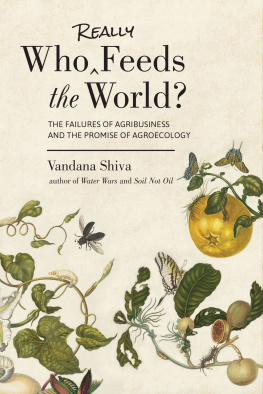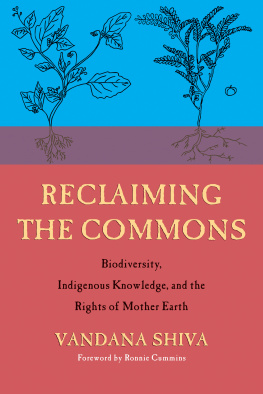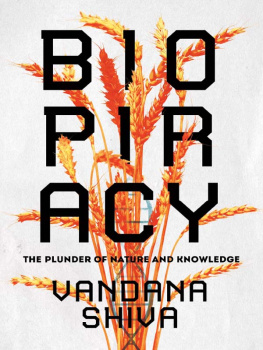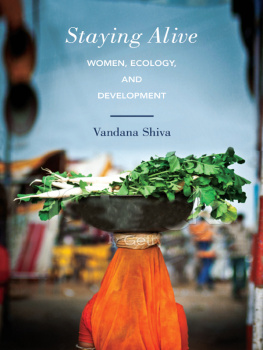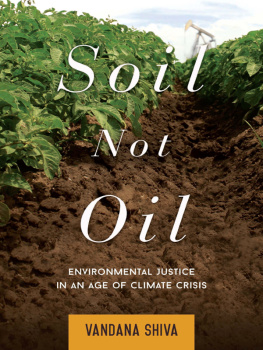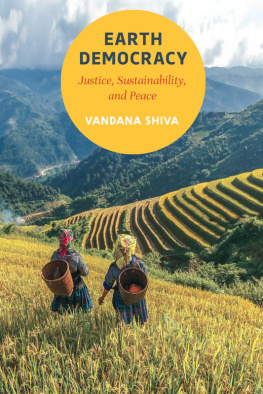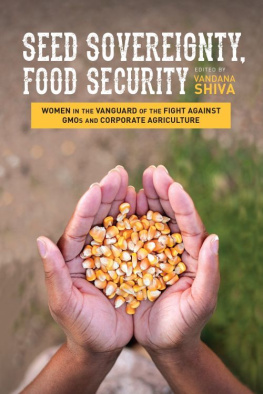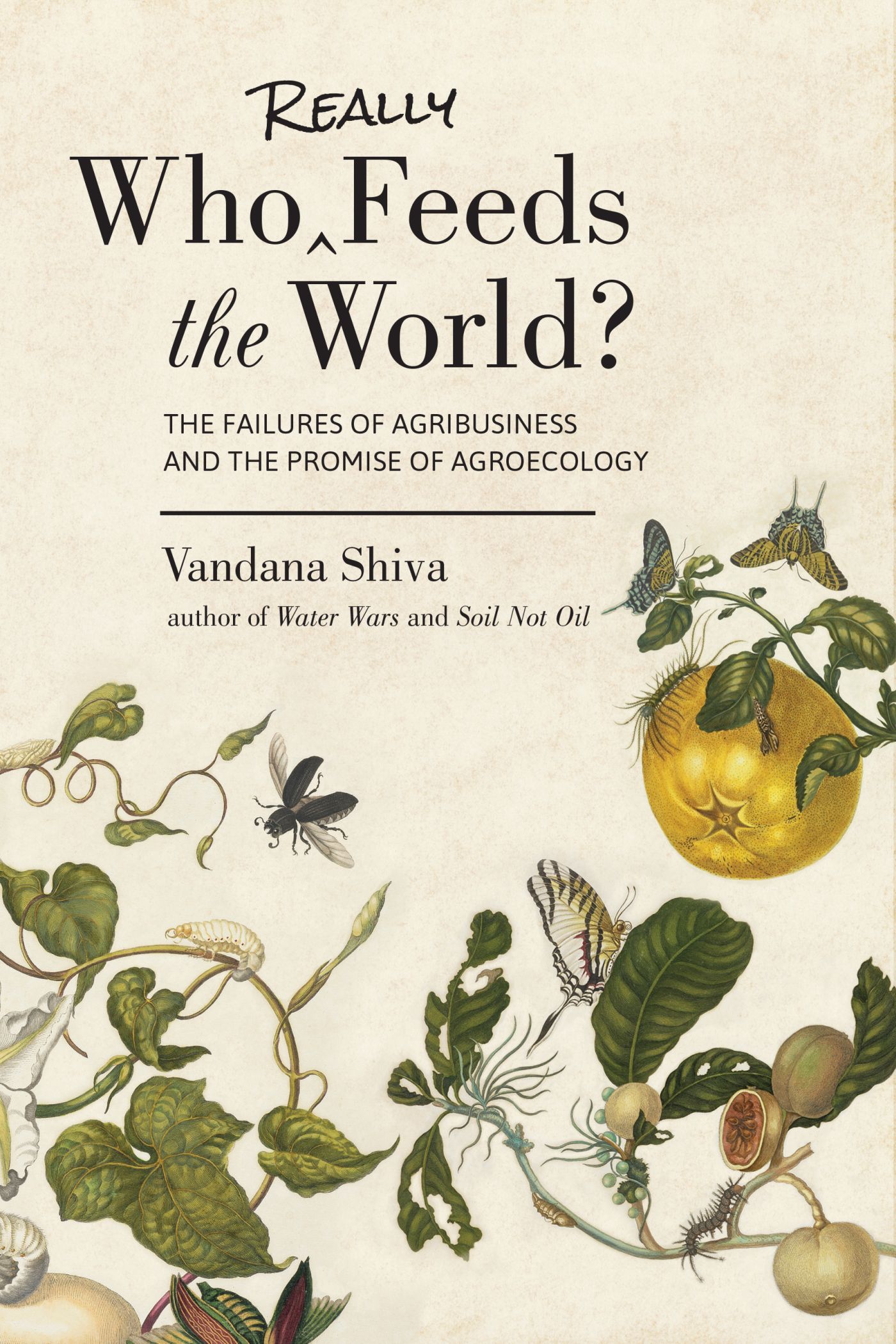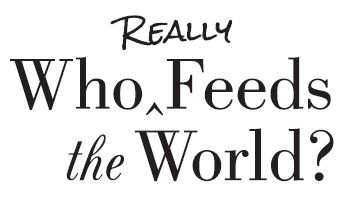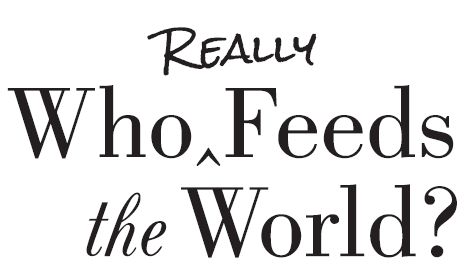THE FAILURES OF AGRIBUSINESS AND THE PROMISE OF AGROECOLOGY
Vandana Shiva

North Atlantic Books
Berkeley, California
Copyright 2016 by Vandana Shiva. All rights reserved. No portion of this book, except for brief review, may be reproduced, stored in a retrieval system, or transmitted in any form or by any meanselectronic, mechanical, photocopying, recording, or otherwisewithout the written permission of the publisher. For information contact North Atlantic Books.
Published by
North Atlantic Books
Berkeley, California
Cover design Jasmine Hromjak
Cover art by Maria Sibylla Merian and Joseph Mulder, Moonflower (Ipomoea alba) with Passalus interruptus beetle and jewel beetle (Euchroma gigantea) and Pomelo or shaddock (Citrus maxima) with metamorphosis of moth (Urania leilus), 1719; Maria Sibylla Merian and Peter Sluyter, Duroia eriopila with zebra swallowtail (Eurytides protesilaus) and Xanthocleis psidii larva and pupa, 1719; Joris Hoefnagel and Georg Bocskay, Insects, Orange Lily, Caterpillar, Apple, and Horse Fly and Fly, Caterpillar, Pear, and Centipede, 1561-1562. Digital images courtesy of the Gettys Open Content Program.
Who Really Feeds the World? The Failures of Agribusiness and the Promise of Agroecology is sponsored and published by the Society for the Study of Native Arts and Sciences (dba North Atlantic Books), an educational nonprofit based in Berkeley, California, that collaborates with partners to develop cross-cultural perspectives, nurture holistic views of art, science, the humanities, and healing, and seed personal and global transformation by publishing work on the relationship of body, spirit, and nature.
North Atlantic Books publications are available through most bookstores. For further information, visit our website at www.northatlanticbooks.com or call 800-733-3000.
Library of Congress Cataloging-in-Publication Data
Shiva, Vandana, author.
Who really feeds the world? : the failures of agribusiness and the promise of agroecology / Dr. Vandana Shiva.
pages cm
An in-depth look at agroecology, an alternative to the worlds current food crisis Provided by publisher.
ISBN 978-1-62317-062-2 (pbk.)
ISBN 978-1-62317-063-9 (ebook)
1. Food supply. 2. Agricultural ecology. 3. Agricultural industries. I. Title. II. Title: Failures of agribusiness and the promise of agroecology.
HD9000.5.S455 2016
338.19dc23 2015034909
To all the beings that give us food.
To Richa, for her editing.
Contents
We are facing a deep and growing crisis rooted in how we produce, process, and distribute our food. The planets well-being, peoples health, and societies stability are severely threatened by an industrial globalized agriculture driven by greed and profits. An inefficient, wasteful, and nonsustainable model of food production is pushing the planet, its ecosystems, and its diverse species to the brink of destruction. Food, whose primary purpose is to provide nourishment and health, is today the single biggest health problem in the world: nearly one billion people suffer from hunger and malnutrition, two billion suffer from diseases like obesity and diabetes, and countless others suffer from diseases, including cancer, caused by the poisons in our food.
Instead of remaining a source of nourishment, food has been transformed into a commodity: something to be speculated on and profiteered from. This leads to rising food prices and creates social instability everywhere. Since 2007 there have been fifty-one food riots in thirty-seven countries, including Tunisia, South Africa, Cameroon, and India. The food system is badly broken on every measure that counts: sustainability, justice, and peace.
Today, an alternative has become an imperative for our survival, so let us begin by asking the question, Who feeds the world?
Food and agriculture have become sites for major paradigm wars. Under each paradigm, a certain type of knowledge, economics, culture, and, of course, farming is being promoted. Each paradigm claims to feed the world; in reality, only one does.
The dominant paradigm is industrial and mechanized, which has led to the collapse in our food and agricultural systems. This crisis is not an accident; it is built into the systems very design. At the heart of this paradigm is the Law of Exploitation, which sees the world as a machine and nature as dead matter. This paradigm sees humans as separate from nature, and every part of nature as separable from the rest: the seed from the soil, the soil from the plant, the plant from the food, and the food from our bodies. The industrial paradigm is also based on seeing humans and nature as mere inputs in a production system. The productivity of the Earth and its people is made invisible by a sophisticated intellectual infrastructure that puts the twin constructs of capital and corporations at the center of its economics.
The paradigm of industrial agriculture is rooted in war: it very literally uses the same chemicals that were once used to exterminate people to destroy nature. It is based on the perception that every insect and plant is an enemy to be exterminated with poisons, and is constantly seeking new and more powerful instruments of violence, including pesticides, herbicides, and genetically engineered pesticide-producing plants. While the technologies of violence grow more sophisticated, the knowledge of ecosystems and biodiversity shrinks. The deeper the ignorance of the planets rich biodiversity and ecological processes, the greater the arrogance of corporate destroyers who claim to be creators. Life is thus redefined as an invention of those whose only desire and capacity is to poison and kill it.
Tools governed by the Law of Exploitation and the Law of Domination harm peoples health and the environment. These tools are often poisons marketed as agrochemicals, and we are told that farming is impossible without them. In reality the corporations that make these chemicals are shaping the paradigm of possibility. They define what constitutes scientific knowledge, what an efficient food production system looks like, and what the boundaries of research and trade should be. When applied to agriculture and the food system, a paradigm rooted in the violence of war and a militarized mindset brings the war to our fields, to our plates, and to our bodies.
But there is another new, emerging paradigm, one that maintains continuity with time-honored ways of working together with nature and is governed by the Law of Return. Under this law, all living beings give and take in mutuality. This ecological paradigm of agriculture is based on life and its interconnectedness. It is centered on the Earth and small-scale farmers, and especially women farmers. It recognizes the potential of fertile seeds and fertile soils to feed humanity and diverse species to whom we are all related as Earth Citizens. Under this paradigm, the role of the human community is to act as cocreators and coproducers with Mother Earth. Within this paradigm, knowledge is not owned; rather, knowledge grows through farming, where we are all participants in the web of life. In ecological agriculture, the cycles of nature are intensified and diversified so as to produce more and better food, while using fewer resources. In ecological farming, the waste of the plants becomes food for farm animals and soil organisms. Adhering to the Law of Return, there is no waste; everything is recycled.

